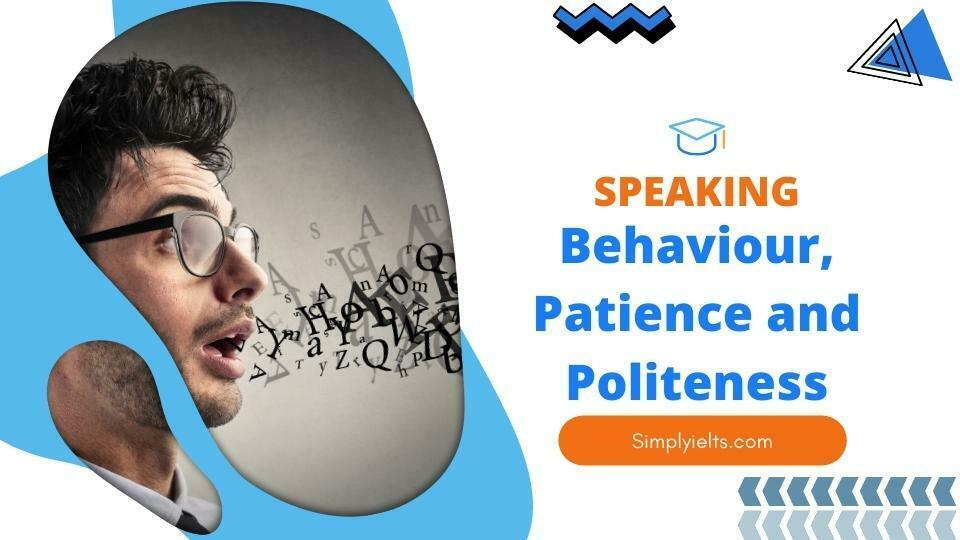IELTS Speaking test: Behaviour, Patience and Politeness

On IELTS Speaking test, people are asked questions on behaviour politeness and patience. I know these are very difficult topics to tackle. Many students run out of ideas while speaking about them. However, they can always deal with these topics if they can have some ideas about how to answer these questions without many efforts. Here are some sample questions and answers on the topic.
IELTS Speaking Part 1
Patience
What do you think patience is?
For me, patience is the ability to wait for things to happen in its course without getting frustrated. For example, waiting in line to get your favourite food at your favourite restaurant or even waiting for an offer letter from your first job.
Do you think patience is necessary?
Yes, being impatient can create some problems. For example, I once bought an overpriced product in a hurry only to find out that a better one at a justified price was available after a few days. This incidence made me aware of the importance of being patient.
Do you think you are a patient person?
Sadly, no. I am very impulsive and therefore tend to act out rashly. I cannot be patient. I guess it runs in the family.
Have you ever lost your patience?
The last time I lost my patience was when my car would not start, and I was stuck in the middle of nowhere. There was some issue that had occurred suddenly, and it could not be moved without a tow truck.
Politeness
Are you a polite person?
Yes. I was taught that manners are essential and that you should always respect others. Therefore, I always make it a point to be polite to everyone. It is actually quite useful in challenging situations.
Who taught you to be polite?
It was my parents who taught me to be polite. They made me read through tons of books to ensure that I realise being nice to people pays off.
Is it essential to be polite?
Absolutely. It helps you get the upper hand when it comes to dealing with people who can be difficult. Als, people will always ask you for your opinion and trust you with a lot of personal matters.
What do you do if others are not polite to you?
Well, I usually leave them alone or distance myself from them. I also try not to associate myself with people who are not polite. I have had personal trouble with them, and so, I tend to run away instead of being around them.
IELTS Speaking Part 2
Cue Card 1 on patience
Describe a situation when you had to wait for something special to happen.
You should say:
- what it was
- what you did during that time
- what eventually happened
- and explain what happened afterwards.
Answer
It was five years ago. I had just passed all my board exams without any trouble. The results were out, and I had performed well above expectations. Therefore, my parents and I had a small party. Father went out before the party to get something. He came back two hours later with a small, wrapped package. And that is the story of how I got my first smartphone.
While he was gone, I spent the time with my friends and my mother celebrating. We mixed different types of cold drinks and played arcade games. We also played nostalgic card games. After the party was over, there was nothing much to do than waiting for my father to return and clean up any accidental mess that had been made.
Because of my love for technological things, I immediately took the phone apart to see how it worked. These were those times where phones could easily be pulled apart and put together again. So, I did zero damage to my phone. The phone lasted for years before dying and now hangs on my wall.
Cue Card 2 on politeness
Talk about a time when you had to be a polite person.
You should say
- When did this happen?
- How did you do this?
- Why did you have to be polite?
- How did you feel later?
Answer
The one time that I had to struggle to be polite was when I was dealing with a rude person at a multi-purpose shop. She seemed to be one of those entitled people who enjoyed making the cashier’s lives miserable.
When I reached the check-out counter, this woman was repeatedly shouting and cursing at the cashier. Due to an error, her card had made the payment twice instead of only once. She had demanded a refund for one payment in cash, and due to policy, the cashier refused. As I was the next one in line, I helped the cashier and the woman clear this out.
I feel that I had to be polite as being anything else would only have escalated the situation. Being polite was the only way to handle and tone down the situation. I felt that I had done an excellent job in retrospect. There was nothing else I could do but deescalate the situation like that. The woman calmed down in the end and apologised to the cashier in the end.
Cue Card 3 on polite person
Describe the most polite person you know.
You should say:
- who this person is
- how you met him/ her
- whether you enjoy his/her company or not
- and explain why you think him/her to be the most polite person.
Answer
The politest person that I know is my best friend. Her name is Mira, and she and I met while we were in college. She is my junior, but we did not know each other till much later. We ran into each other by accident in a mall, and as we were the only two people left that hadn’t left the city during the holidays, we decided to hang out. A full three weeks later, we became fast friends.
We love hanging out with each other. We meet mostly in cafes or restaurants and work together on our respective assignments. We also hang out at each other’s houses to experiment with cooking and art. We share similar interests too.
In my opinion, she is the politest person I know because she was taught to be polite to everyone, human or animals. She is kind and caring to everyone and plans to be a psychiatrist to help others out. She is also famous for helping others in their college work as well as participating in a lot of college events.
IELTS Speaking Part 3
Politeness
In your country’s culture, how do you show that you are polite?
In my country’s culture, people show politeness with kind words and friendly body language. Additionally, there are certain customs and traditions. For example, in my country, children usually stand in front of elders till the seniors ask them to sit. Also, the youngsters typically touch the feet of senior family members if they are meeting after a long gap in time.
Are we less polite with members of our families than with people we don’t know?
No. In my opinion, we are less polite to our family members, than we are to people whom we don’t know. This is because we are taught to be courteous of strangers, and since there is a deeper bond with our family members, we are not polite towards them.
Role models
Which types of people become role models in your society?
In my society, people who are kind and helpful become role models for the community. They are those who chose to help others regardless of their wealth, background or reputation. They often pour their soul into ensuring that whoever seeks help gets it. For example, one of the most famous personalities in my country is Mahatma Gandhi, who is known as the epitome of politeness.
Do you agree that famous people have more responsibilities than ordinary people?
Yes. Famous people will always hold more responsibilities than ordinary people. This is because people hang on to their every word and listen to them. The fans will aspire to be like them and emulate them. Therefore, they have to be careful of their actions.
What happens when young people lack good role models?
I believe they go down the wrong path. As the role model is not able to steer the person into making the right decisions, it so happens that the young person will most likely not have a firm moral ground. Therefore, they will make the wrong decisions.
What standards of behaviour should teachers set?
I believe that teachers should set a high standard for their students. This is because teachers are responsible for the students’ future. In teaching the students to be morally right, teachers ensure that the future of the students is bright. This will lead the students to live lives of upstanding citizens.
Do you agree that you should never meet your heroes?
I agree. I have personally met my heroes only to be disappointed by them. A lot of heroes are not who they seem to be. Therefore, while there is no harm in making someone their hero, one should not meet them.
What benefits a famous person get that ordinary people cannot?
There are a lot of benefits that famous people have. They get their fair pick of houses and other comforts. They are also the people who can influence the thoughts of the society besides having the power to do so by their actions. They again can do almost anything and get away with it.



Responses